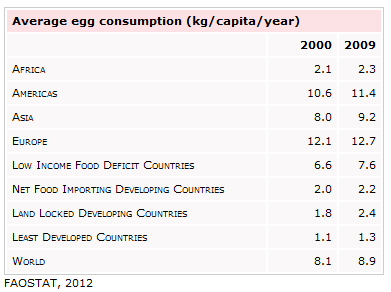



World Egg Day Celebrated Today
GLOBAL - Increased egg production and consumption in the developing world could significantly improve food and nutrition security, especially for growing minds. FAO and the International Egg Commission (IEC) are working in partnership to reach that common goal.Eggs are an inexpensive source of high-quality protein, essential vitamins, and minerals that are needed for a healthy diet and a healthy life, reports FAO. This is especially important for the nutrition of growing children. Chicken eggs can even be made healthier for people by enriching key vitamins, such as folic acid, B12 and vitamin E by increasing the content of these nutrients in hens’ diets.
Eggs are easy to cook and eat, and they are a mainstay in many cultures. They can be prepared as a meal on their own or as a key recipe ingredient, such as in cakes, breads and sauces. Eggs should be an essential food in school feeding programs in countries where school meals are sometimes children’s only meals.
However, eggs are not as widely available as they could be, especially in sub-Saharan Africa.
There are huge variations in egg consumption levels from country to country. Depending largely on the countries’ levels of wealth, annual consumption of eggs ranges from as low as 300g per person in African countries like Burundi, Rwanda, Chad and Niger to 19.1kg in Japan. Out of 43 countries in sub-Saharan Africa, only nine countries have an average consumption that is higher than 2kg while in most of Asia and the Americas, people eat at least twice that amount.

Eggs can be easily stored and transported. By maintaining low storage temperatures, eggs can be kept for longer while preventing food-borne illnesses, such as Salmonella Enteritis. This, together with good layer flock management, can reduce potential risks to human health.
Traditional poultry production systems in developing countries use most eggs for incubation, according to FAO. By improving the management of production and health, more birds will survive and fewer eggs will be needed for incubation and replacement of stocks. Family farm production and commercial production in developing countries should be sustainably intensified to achieve surplus poultry production and potentially more eggs for families’ own food needs and eventually for marketing to consumers, increasing household income.
FAO supports the development of family poultry production systems through the implementation of country projects, training of technical staff and cooperation with the International Network for Family Poultry Development (INFPD) as well as with the IEC. Recent FAO investigations of the performance and economics of small commercial egg producers in Ghana, Tanzania and Zambia have shown opportunities for income generation but also important constraints regarding the management and health of the flocks. To increase egg production, more capacity building for producers, technical staffs and other value chain actors is required.
World Egg Day is promoted by the IEC to raise global awareness about the role of eggs in people’s diets. The IEC cooperates with FAO on nutrition security and on improving the environmental performance of the egg industry.








